新编英语教程第三版第二册unit 3
新编英语教程第三版BOOK2 Unit 3

When may / might as well + do used with the first person pronoun, it expresses “intention” in an unemphatic way.
may / might as well use my bike. The last bus might have gone)
Unit 3
Dialogue I
Pollution Control
Think it
➢ How many kinds of pollution are there nowadays? ➢ What causes these pollution? What bad influences
Questions
Browse through the text, try to answer following questions. 1. Why is London no longer a city full of fog? 2. What is the cause of air and water pollution in the city where the
2. She should / ought to have had more oral practice during the term.
3. She needn’t have learned all the dialogues by heart.
4. 3. He may / might have gone without you.
新编英语教程2第三版第3单元课件
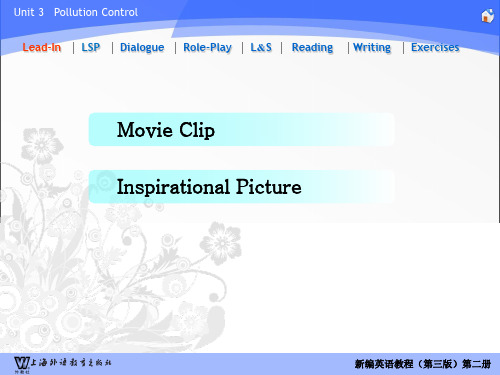
Movie Clip Inspirational Picture
新编英语教程(第三版)第二册
Unit 3 Pollution Control Lead-In LSP Dialogue Role-Play L&S Reading Writing Exercises
新编英语教程(第三版)第二册
Unit 3 Pollution Control Lead-In LSP Dialogue Role-Play L&S Reading Writing Exercises
Inspirational Picture This photo was taken in Linfen, Shanxi province. What does it bring to your mind? Can you describe the picture?
新编英语教程(第三版)第二册
Unit 3 Pollution Control Lead-In LSP Dialogue Role-Play L&S Reading Writing Exercises
all-access hoverchairs: the chairs that float in the air and can go anywhere. This is a special device in which people lie and travel everywhere in the Axiom in this movie.
except John. John should/ought to have come with us.
第三版:综合英语教程第二册第3单元课件r

Conversation
A:Hi, Peter, walking your dog again? B:Rose, her name's Rose! Haven't I told you before? A:Oh, yes. ...Very good. Er ... she looks like a good dog, but the dogs in my neighbourhood are very noisy. I simply can't bear to hear them barking all day long. B: Oh, do they often bark? Um ... I think ... A: You know, Peter, I've always wondered why on earth people like keeping pets. B:Well, I guess, pets ... especially dogs ... they keep you company, don't they? They are like your friends.
B: Me, a pessimist? Are you joking? I love life, not just our own life, but the life of animals, of my pets. Let me tell you the truth, I also keep a dozen of goldfish, a couple of birds, and I'm going to keep a cat soon. A:Oh, really? That should really keep you busy. But, man, have you ever heard of the saying"life is short?" Spending too much on those things certainly won't make the best of your life. B:"Life is short!" What a pessimist you are! Ha,ha,ha ...
新视野大学英语第三版读写教程第二册Unit3课文及翻译
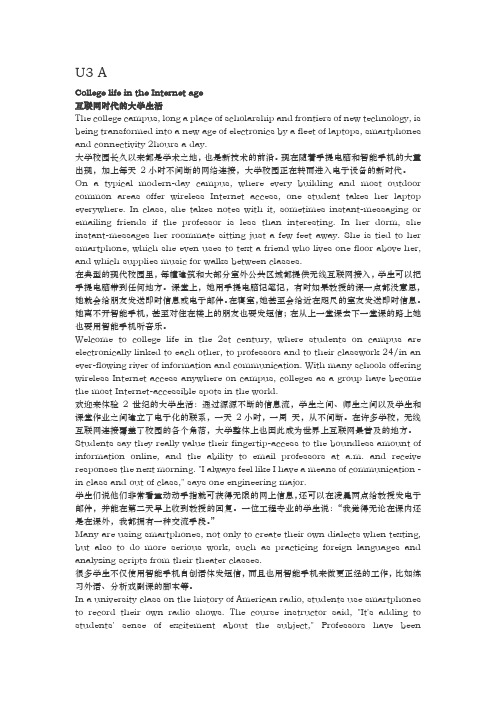
U3 ACollege life in the Internet age互联网时代的大学生活The college campus, long a place of scholarship and frontiers of new technology, is being transformed into a new age of electronics by a fleet of laptops, smartphones and connectivity 2hours a day.大学校园长久以来都是学术之地,也是新技术的前沿。
现在随着手提电脑和智能手机的大量出现,加上每天2小时不间断的网络连接,大学校园正在转而进入电子设备的新时代。
On a typical modern-day campus, where every building and most outdoor common areas offer wireless Internet access, one student takes her laptop everywhere. In class, she takes notes with it, sometimes instant-messaging or emailing friends if the professor is less than interesting. In her dorm, she instant-messages her roommate sitting just a few feet away. She is tied to her smartphone, which she even uses to text a friend who lives one floor above her, and which supplies music for walks between classes.在典型的现代校园里,每幢建筑和大部分室外公共区域都提供无线互联网接入,学生可以把手提电脑带到任何地方。
新编英语教程第三版第二册unit 3
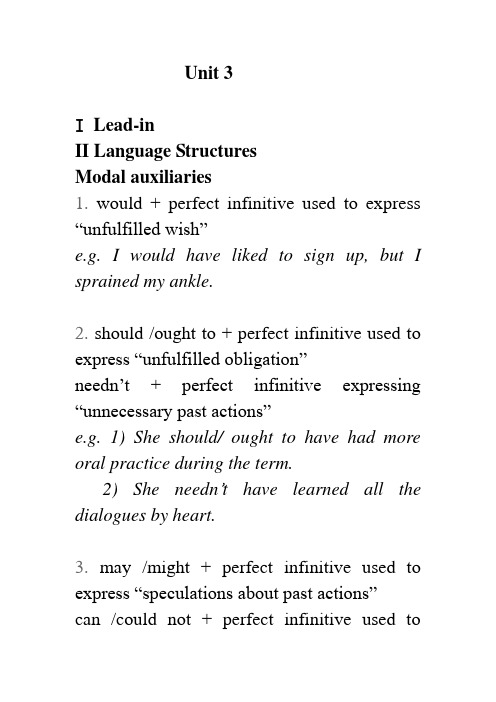
Unit 3I Lead-inII Language StructuresModal auxiliaries1. would + perfect infinitive used to express “unfulfilled wish”e.g. I would have liked to sign up, but I sprained my ankle.2. should /ought to + perfect infinitive used to express “unfulfilled obligation”needn’t + perfect infinitive expressing “unnecessary past actions”e.g. 1) She should/ ought to have had more oral practice during the term.2) She needn’t have learned all the dialogues by heart.3. may /might + perfect infinitive used to express “speculations about past actions”can /could not + perfect infinitive used toexpress “negative deduction about past actions”e.g. 1)He may/might have gone to the library.2) She can’t/couldn’t have gone to the library.4. must + perfect infinitive used to express “affirmative deduction about past actions”may /might as well used with the second person pronoun expressing “suggestions”e.g. 1) She must have gone to the language lab.2) Y ou may/might as well use my bike.Preparatory QuestionsDirections: Recast the following sentences using the following phrases:1. “would have liked to (do)”Notice:would have liked to (do)is used with the first person to express the speaker’s wish that was not fulfilled.1) I intended to go skating with you yesterdaybut I couldn’t because my mother didn’t let me.(Response: I would have liked to go skating with you yesterday, but my mother didn’let me.)2) I meant to sit in on Professor Wang’s class this morning but I didn’t because I had an important meeting to attend.(Response: I would have liked to sit in on Professor Wang’s class this morning, but I had an important meeting to attend.)3) I intended to take part in the basketball match yesterday afternoon but I couldn’t because I had a bad fall yesterday morning. (Response: I would have liked to take part in the basketball match yesterday afternoon, but I had a bad fall yesterday morning.)4) I planned to lend you my cassette recorder, but I didn’t, because it was out of order. (Response: I would have liked to lend you my cassette recorder, but it was out oforder.)2. should/ought to + perfect infinitive Notice:should/ought to + perfect infinitive, indicating a past obligation that was not fulfilled1) The exhibition was a good one. All of us visited it except John.(Response: : John should/ought to have come with us.)2) We all learned a lot from the lecture, but Li didn’t attend it.(Response: : Li ought to/should have attended the lecture.)3) The engineer went to the research institute without an umbrella and was caught in the rain.(Response: : The engineer ought to/should have taken an umbrella with him.)4) They bought a book for Mary but she didn’t like it.(Response: : They oughtn’t to/shouldn’t havebought the book for Mary.)needn’t + perfect infinitiveNotice: needn’t + perfect infinitive, indicating something that was unnecessarily done in the past1) I wrote a summary in more than five hundred words. But the teacher only asked for 200 words.(Response: : I needn’t have written such a long summary.)2) Lin answered all the ten questions in the test paper. But we were only required toanswer eight of them.(Response: : Lin needn’t have answered all the ten questions in the test paper.)3) Mary went to the station an hour before the train started.(Response: : Mary needn’t have gone to the station so early.)4) Yao carried all the parcels home herself. She didn’t know they would deliver them ifshe asked them.)(Response: : Yao needn’t have carried all the parcels home herself. They would have delivered them if she had asked them.)3.may/might +perfect infinitiveNotice: may/might +perfect infinitive, indicating speculations about past actions1) Where is Susan? I want to go to the canteen with her.(Response: : She may/might have gone there already.)2) It’s a fortnight since Sun went to the South and we haven’t got a word from him. I wonder if he’s forgotten us all. (Response: : He may/might have been very busy with his work there.)3) Sid told me he’d let me have the library book after he’d finished with it. It’s a week since he said that and he still hasn’t given me the book.(Response: : He may/might have returned thebook to the library. // He may / might not have finished reading it yet.)4) I’ve been looking for my bicycle key for three days, and it’s still nowhere to be found. (Response: : You may/might have lost it.)can’t/couldn’t + perfect infinitiveNotice: can’t/couldn’t + perfect infinitive, indicating negative deduction about past actionsThe first part of the response can be given to the students as a prompt.1) Where is my typewriter? Someone must have stolen it last night.(Response: : It was here a moment ago. It couldn’t have been stolen last night.)2) Keith ought to be here now. Perhaps he’s lost his way.(Response: : I told him how to come and I even drew him a map. He can’t have lost his way.)3) Who brought the refrigerator upstairs?Perhaps it was Tim.(Response: : Tim’s not that strong. He couldn’t have brought it by himself.)4) A man answered the phone. I suppose it was her husband.(Response: : But her husband hasn’t come back from abroad yet. It couldn’t have been her husband.)4. must + perfect infinitiveNotice: must + perfect infinitive, indicating affirmative deduction about past actions1) The film he saw last night was wonderful. (Response: : He must have enjoyed seeing it.)2) He looks tired, doesn’t he?(Response: : He must have worked hard. / He must have stayed up late last night.)3) The children were making a lot of noise until five minutes ago. Now it is so quiet. (Response: : The children must have gone away.)4) James has checked all the figures twice over,but he can’t get the correct answer. (Response: : James must have made a mistake somewhere.)5. may/might as wellNotice: may/might as well, used with the second person pronoun to express the speaker’ssuggestion(s)1) I am so exhausted after work. (Response: : You may/might as well go to sleep.)2) I’m not feeling well. I think I’ve got a cold. (Response: : Being so weak, you may/might as well see a doctor.)3) It is too hot for Karen and me to go for a picnic.(Response: : Why don’t you change it to another day? You may/might as well go to a movie today.)4) Nick won’t take up the additional work. He just wants to do his part.(Response: : You may/might as well ask Lucy to do it. To get ahead on her job, she iswilling to try new things.)Dialogue Pollution ControlA.Listening to the recordingB.Q uestions on the dialogue1.W hy is London no longer a city full of fog?2.W hat is the cause of air and water pollution in the city where A lives?3.W hat problems do car bring?4.W hat should be done to bring pollution in China completely under control?5.D o you think that environmental pollution in China has been effectively reduced? If so, please cite some facts or examples.C. Language Points1.It must be terrible living there.—Living there must be terrible. The introductory it is a formal subject, whereas the -ing participleliving is the real subject. Another example, e.g. It is great fun boating on the lake.2. the Clean Air Ac t — This was the result of the recommendations made by the Beaver Committee which was set up to inquire into the question of urban pollution in Britain. The committee was so named because its chairman was Sir Hugh Beaver.3. enforce v .give emphasis or strength to sth.加强;make sth.(a law ) obeyed or effective by force强迫服从,实施;force or cause sth. to be done or to happen迫使(某事)发生e.g. 1) Mike must provide enough examples to enforce his argument.2) Y ou have no right to enforce your own views on me.3) The government is unable to enforce its own laws and regulations.4. the Thames/temz/is swarmingwith fish —the River Thames is full of fish that move about busily. The names of rivers are preceded by the definite article the, e.g., the Yangzi River, the Yellow River, the Hudson River, the River Mississippi.e.g. 1)Each summer the swimming pool swarms with people.2) That town is always swarming with tourists from all over the world.5. double: twice as much or as many as usual; 成双的,双重的,两倍的a. n. v.a double bed/room at/on the double 迅速地,立即地;以跑步方式e.g.1) The boss will give him double pay for working overtime.2) The date had a double significance.3) Y ou’d better be double careful when crossing the street.4) The population of Japan doubles that of Canada.5) The child birthrate in that area hasdoubled.6. torment n. extreme suffering, especially mental suffering; a person or thing that causes this.痛苦,折磨 v.e.g. 1) Love is a sweet torment.2) David has never suffered the torment of rejection.3)They never torment themselves or each other over imperfections.7.treatment devices—devices used to treat smoke, dust, and water pollution 治理三废设备e.g. 1) The television receiver is an electronic device.2) Sending advertising by email is very effective marketing device.3) His illness is merely a device to avoid seeing his girlfriend.8. residential a. containing or suitable for private houses; connected with or based on residence住宅的,与居住有关的e.g.1) Gradually the surrounding farmland turned into residential areas.2) It is a nice residential section, equipped with modern conveniences.resident a. 居住的;n.居民,居住者residence n. 居住,住宅reside v.居住,定居9.irritate v. make ab. angry, annoyed or impatient 激怒,使烦躁;cause discomfort to(a part of body)使不舒服,刺激e.g. 1) Our faults irritate us most when we see them in others.2) Her effusive manner of greeting her friends finally began to irritate them.3) These tight shoes irritate my toes.10. more and more people have come to know how harmful... —more and morepeople begin to know how harmful ... The infinitive after the verb come expresses an action that takes place gradually over some time.e.g.After working with Mrs. Brown, who appeared quite hard-hearted, in the same office for many years, I’ve come to see that she has a heart of gold.11. make stricter laws to that effect—make stricter laws with the intention to forbid car horns blowing in the streets. The word effect refers to what B says in the preceding line “it’s against the law to blow car horns in any street in town.”to that effect: used to show that you’re giving the general meaning of what sb. has said or written rather than te exact words表示那个/这个意思,大意如此e.g.1)He said he was greatly worried, or words to that effect.2) Mary said she hated to see John, or hearof the words to that effect.to this/the effect 大意是说to good/great/ dramatic effect 产生好的结果to no effect 无效果,不起作用Expressions in Focus1. “do away with...”—terminate, get rid of; abolish sth. e.g.e.g. 1) Why not do away with all the junk in your room? It is getting more and more untidy!2) How could they do away with a lovely old building like that and put a car park there instead?3) These ridiculous rules and regulations should have been done away with years ago.2. “add to…”— increase or have an increased effect;“add sth. to sth.” —put sth. together with sth. else so as to increase e.g.e.g.1) His words did nothing but added to myanger.2) The bad weather only added to our difficulties.3) Teachers should exercise their imagination and add art to their teaching.3. “bring…under control”—subdue or master sth.e.g.1) To bring the noisy children under control, the teachers told them the story of “Buzzy Bees”.2) Hundreds of firemen have brought a wildfire spread over nine square kilometers of land under control after battling to put out the flames for two days.3) The Prime Minister said yesterday that the government is making all efforts to bring the high inflation under control.D. RetellingSample outline for retellingB, a student from England, is talking to A about the pollution problem.1. B tells A about London at present: the steps that have been taken by the government and the change that has taken place.2. A and B talk about the pollution problem in China:1) air pollution in factory zones;2) noise pollution in city streets;3) A tells B that the Chinese government has taken some measures to control pollution.Reading I Environment PollutionA. Pre-Reading ActivityThe environmental pollution on our planet has caused undesirable change and harmfully affected health, survival and activities of humans and other living organisms. Now, please think about the following questions before you read the text.1.What are the major causes of environmental pollution?Sample: Development of industry and Urbanization.2.Is the place where you live polluted or even seriously polluted? If so, describe to your partner.3. What can we do to reduce environmental pollution?Sample: We should curb the sewage and smoke from factories, perform garbage classification and recycle wastes.B. Background NotesParticle Pollution (PM10) and (PM2.5)1.Particle(n.颗粒,微粒;微量,极小量) pollution(also known as "particulate<n.微粒,颗粒,粒子> matter") in the air includes a mixture of solids and liquid droplets(液体的小滴). Some particles are emitted directly; others are formed in the atmosphere when other pollutants react. Particles come in a widerange of sizes. Those less than 10 micrometers in diameter直径(PM10) are so small that they can get into the lungs, potentially causing serious health problems. Ten micrometers is smaller than the width of a single human hair. Fine particles (PM2.5). Particles less than 2.5 micrometers in diameter are called "fine" particles. These particles are so small they can be detected only with an electron microscope. Sources of fine particles include all types of combustion, including motor vehicles, power plants, residential wood burning, forest fires, agricultural burning, and some industrial processes.Coarse(粗糙的,粗鲁的;粗野的,粗俗的)dust particles. Particles between 2.5 and 10 micrometers in diameter are referred to as "coarse." Sources of coarse particles include crushing or grinding operations, and dust stirred up by vehicles traveling on roads.2. fog and haze雾霾Fog and haze differ in that fog is a thick, opaque(不透明的,晦涩的;难以理解的)effect that lasts a short time, while haze is a thin, translucent (a.半透明的)effect that lasts a long time.FogWhether created by nature or machine, fog consists of liquid droplets suspended(v.使悬浮;悬,挂;停止,终止;延缓,暂缓执行)in the air. Fog machines create fog by vaporizing(v.使蒸化,使汽发;吹牛,吹嘘)fog fluid –that is, they convert the fog fluid from a liquid form to an aerosol(n.悬浮微粒,浮质;烟雾机,气雾剂)form.HazeLike fog, haze consists of liquid droplets, but the drops are very fine and are distributed evenly over a large area to form a mist.C.Questions on P35.nguage Points1.surroundings—the conditions, scenery,etc. around a person, place or thing; environment. The word “surrounding”, however, is generally used as an adjective.e.g. They make regular checks on the surrounding areas for pollution levels.2. The adjective “dirty” and the noun “poison” are used as verbs here, which respectively mean “to make…dirty” and “to put poison in” or “to cause poisoning”.3.pesticide n. chemical substance used to kill pests, esp. insectse.g.1)The biotechnology company is developing a range of new pesticide.2)The insects have become resistant to the pesticide.4.ruin v. n. severe damage or destruction毁灭,破坏;废墟e.g.1) The most glorious city at the time was burned down to be fiery ruins.2) Whom God would ruin, he first deprives of reason.3)One indiscreet remark at the wrong moment could ruin the whole plan.若时机不当,一言不慎,可能毁掉整个计划。
新编英语教程第三版第二册unit

Unit 3I Lead-inII Language StructuresModal auxiliaries1. would + perfect infinitive used toexpress “unfulfilled wish”. I would have liked to sign up, but I sprained my ankle.2. should /ought to + perfect infinitive used to express “unfulfilled obligation”needn’t + perfect infinitive expressing “unnecessary past actions”. 1) She should/ ought to have had more oral practice during the term.2) She needn’t have learned all the dialogues by heart.3. may /might + perfect infinitive usedto expre ss “speculations about pastactions”can /could not + perfect infinitive used to express “negative deduction aboutpastactions”. 1)He may/might have gone to the library.2) She can’t/couldn’t have gone to the library.4. must + perfect infinitive used to express “affirmative deduction about past actions”may /might as well used with the second person pronoun expressing “suggestions”. 1) She must have gone to the language lab.2) You may/might as well use my b ike.Preparatory QuestionsDirections: Recast the followingsentences using the following phrases:1. “would have liked to (do)”Notice: would have liked to (do) is used with the first person to express the speaker’s wish that was not fulfilled.1) I intended to go skating with you yesterday but I couldn’t because my mother didn’t let me.(Response: I would have liked to go skating with you yesterday, but my mother didn’let me.)2) I meant to sit in on Professor Wang’s class this morning but I didn’t because I had an important meeting to attend. (Response: I would have liked to sit inon Professor Wang’s class this morning, but I had an important meeting to attend.)3) I intended to take part in the basketball match yesterday afternoon but I couldn’tbecause I had a bad fall yesterdaymorning.(Response: I would have liked to take part in the basketball match yesterday afternoon, but I had a bad fall yesterday morning.)4) I planned to lend you my cassette recorder, but I didn’t, because it was out of order.(Response: I would have liked to lend you my cassette recorder, but it was out of order.)2. should/ought to + perfect infinitive Notice:should/ought to + perfect infinitive, indicating a past obligation that was not fulfilled1) The exhibition was a good one. All of us visited it except John.(Response: : John should/ought to have come with us.)2) We a ll learned a lot from the lecture,but Li didn’t attend it.(Response: : Li ought to/should have attended the lecture.)3) The engineer went to the research institute without an umbrella and wascaught in the rain.(Response: : The engineer ought to/should have taken an umbrella with him.)4) They bought a book for Mary but shedidn’t like it.(Response: : They oughtn’t to/shouldn’t have bought the book for Mary.)needn’t + perfect infinitiveNotice: needn’t + perfect infinitive, indicating something that was unnecessarily done in the past1) I wrote a summary in more than five hundred words. But the teacher only asked for200 words.(Response: : I needn’t have written such a long summary.)2) Lin answered all the ten questions in the test paper. But we were only required toanswer eight of them.(Response: : Lin needn’t have answered all the ten questions in the test paper.) 3) Mary went to the station an hour before the train started.(Response: : Mary needn’t have gone to the station so early.)4) Yao carried all the parcels home herself. She didn’t know they would deliver them if she asked them.) (Response: : Yao needn’t have carriedall the parcels home h erself. They would havedelivered them if she had asked them.) 3.may/might +perfect infinitiveNotice: may/might +perfect infinitive, indicating speculations about past actions1) Where is Susan? I want to go to the canteen with her.(Response: : She may/might have gone there already.)2) It’s a fortnight since Sun went tothe South and we haven’t got a word from him. Iwonder if he’s forgotten us all. (Response: : He may/might have been very busy with his work there.)3) Sid told me he’d let me have the library book after he’d finished wi th it. It’s a weeksince he said that and he still hasn’t given me the book.(Response: : He may/might have returned the book to the library.4) I’ve been looking for my bicycle key for three days, and it’s still nowhereto be found.(Response: : You may/might have lost it.)can’t/couldn’t + perfect infinitive Notice: can’t/couldn’t + perfect infinitive, indicating negative deduction about past actionsThe first part of the response can begiven to the students as a prompt.1) Where is my typewriter? Someone must have stolen it last night.(Response: : It was here a moment ago.It couldn’t have been stolen last night.)2) Keith ought to be here now. Perhapshe’s lost his way.(Response: : I told him how to come andI even drew him a map. He can’t have lost his way.)3) Who b rought the refrigerator upstairs? Perhaps it was Tim.(Response: : Tim’s not that strong. He couldn’t have brought it by himself.)4) A man answered the phone. I supposeit was her husband.(Response: : But her husband hasn’t come back from abroad yet. It couldn’t have been her husband.)4. must + perfect infinitiveNotice: must + perfect infinitive, indicating affirmative deduction aboutpast actions1) The film he saw last night was wonderful.(Response: : He must have enjoyed seeing it.)2) He looks tired, doesn’t he? (Response: : He must have worked hard. / He must have stayed up late last night.)3) The children were making a lot of noise until five minutes ago. Now it isso quiet.(Response: : The children must have gone away.)4) James has checked all the figures twice over, but he can’t get the correct answer.(Response: : James must have made a mistake somewhere.)5. may/might as wellNotice: may/might as well, used with the second person pronoun to express the speaker’ssuggestion(s)1) I am so exhausted after work. (Response: : You may/might as well go to sleep.)2) I’m not feeling well. I think I’ve got a cold.(Response: : Being so weak, you may/might as well see a doctor.)3) It is too hot for Karen and me to gofor a picnic.(Response: : Why d on’t you change it to another day? You may/might as well go to amovie today.)4) Nick won’t take up the additionalwork. He just wants to do his part. (Response: : You may/might as well ask Lucy to do it. To get ahead on her job,she iswilling to try new things.)Dialogue Pollution ControlA.Listening to the recordingB.Questions on the dialogue1.Why is London no longer a city fullof fog?2.What is the cause of air and water pollution in the city where A lives?3.What problems do car bring?4.What should be done to bringpollution in China completely under control?5.Do you think that environmental pollution in China has been effectively reduced? If so, please cite some facts or examples.C. Language Points1.It must be terrible living there.—Living there must be terrible. The introductory it is a formal subject, whereas the -ing participle living is the real subject. Another example,. It is great fun boating on the lake.2. the Clean Air Ac t — This was theresult of the recommendations made b y the Beaver Committee which was set upto inquire into the question of urbanpollution in Britain. The committeewas so named because its chairman wasSir Hugh Beaver.3. enforce v .give emphasis or strengthto sth.加强;make sth.(a law ) obeyed or effective by force强迫服从,实施;force or cause sth. to be done or tohappen迫使(某事)发生. 1) Mike must provide enough examplesto enforce his argument.2) You have no right to enforce yourown views on me.3) The government is unable to enforce its own laws and regulations.4. the Thames/temz/is swarming with fish — the River Thames is fullof fish that move about busily. Thenames of rivers are preceded by the definite article the, ., the Yangzi River, the Yellow River, the Hudson River, the River Mississippi.. 1)Each s ummer the swimming p ool swarms with people.2) That town is always swarming with tourists from all over the world.5. double: twice as much or as many as usual; 成双的,双重的,两倍的 a. n. v.a double bed/room at/on the double 迅速地,立即地;以跑步方式The boss will give him double pay for working overtime.2) The date had a double significance.3) You’d better be double careful when crossing the street.4) The population of Japan doublesthat of Canada.5) The child birthrate in that areahas doubled.6. torment n. extreme suffering, especially mental suffering; a person or thing that causes this.痛苦,折磨 v.. 1) Love is a sweet torment.2) David has never suffered the torment of rejection.3)They never torment themselves oreach other over imperfections.devices— devices used to treat smoke, dust, and water pollution 治理三废设备. 1) The television receiver is an electronic device.2) Sending advertising by email isvery effective marketing device.3) His illness is merely a device toavoid seeing his girlfriend.8. residential a. containing or suitable for private houses; connected with orbased on residence住宅的,与居住有关的Gradually the surrounding farmland turned into residential areas.2) It is a nice residential section,equipped with modern conveniences.resident a. 居住的;n.居民,居住者residence n. 居住,住宅reside v.居住,定居v. make ab. angry, annoyed or impatient 激怒,使烦躁;cause discomfort to(a part of body)使不舒服,刺激. 1) Our faults irritate us most when w e see them in others.2) Her effusive manner of greetingher friends finally began to irritatethem.3) These tight shoes irritate my t oes.10. more and more people have come to know how harmful ... — more and more people begin to know how harmful ... The infinitive after the verb come e xpresses an action that takes place gradually over some time.working with Mrs. Brown, who appeared quite hard-hearted, in the same officefor many years, I’ve come to see that she has a heart of gold.11. make stricter laws to that effect—make stricter laws with the intention to forbid car horns blowing in the streets. The word effect refers to what B says in the preceding line “it’s against thelaw to blow car horns in any street intown.”to that effect:used to show that you’re giving the general meaning ofwhat sb. has said or written rather than te exact words表示那个/这个意思,大意如此)He s aid he was g reatly worried, or words to that effect.2) Mary said she hated to see John, or hear of the words to that effect.to this/the effect 大意是说to good/great/ dramatic effect 产生好的结果to no effect 无效果,不起作用Expressions in Focus1. “do away with...”—terminate, get rid of; abolish sth. .. 1) Why not do away with all the junkin your room? It is getting more and more untidy!2) How could they do away with a lovely old building like that and put acar park there instead?3) These ridiculous rules and regulations should have been done awaywith years ago.2. “add to…”— increase or have an increased effect;“add sth. to sth.” —put sth. together with sth. else so as to increase .His words did nothing but added to my anger.2) The bad weather only added to our difficulties.3) Teachers should exercise their imagination and add art to their teaching.3. “bring…under control”—subdue or master sth.To bring the noisy children under control, the teachers told them the story of “Buzzy Bees”.2) Hundreds of firemen have brought a wildfire spread over nine square kilometers of land under control afterbattling to put out the flames for twodays.3) The Prime Minister said yesterdaythat the government is making all efforts to bring the high inflation under control.D. RetellingSample outline for retellingB, a student from England, is talking toA about the pollution problem.1. B tells A about London at present: the steps that have been taken by the government andthe change that has taken place.2. A and B talk about the pollutionproblem in China:1) air pollution in factory zones;2) noise pollution in city streets;3) A tells B that the Chinese government has taken some measures to control pollution.Reading I Environment PollutionA. Pre-Reading ActivityThe environmental pollution on our planet has caused undesirable change and harmfully affected health, survival and activities of humans and other livingorganisms. Now, please think about the following questions before you read the text.1.What are the major causes of environmental pollution?Sample: Development of industry and Urbanization.2.Is the place where you live pollutedor even seriously polluted? If so, describe to your partner.3. What can we d o to reduce environmental pollution?Sample: We should curb the sewage and smoke from factories, perform garbage classification and recycle wastes.B. Background NotesParticle Pollution (PM10) and(n.颗粒,微粒;微量,极小量) pollution (also known as "particulate<n.微粒,颗粒,粒子> matter") in the air includesa mixture of solids and liquid droplets(液体的小滴). Some particles are emitted directly; others are formed inthe atmosphere when other pollutants react. Particles come in a wide range of sizes. Those less than 10 micrometers in diameter直径 (PM10) are so small thatthey can get into the lungs, potentially causing serious health problems. Ten micrometers is smaller than the width of a single human hair.Fine particles . Particles less than micrometers in diameter are called "fine" particles. These particles are so small they can be detected only with an electron microscope. Sources of fine particles include all types of combustion, including motor vehicles, power plants, residential wood burning, forest fires, agricultural burning, and some industrial processes.Coarse(粗糙的,粗鲁的;粗野的,粗俗的)dust particles. Particles betweenand 10 micrometers in diameter are referred to as "coarse." Sources of coarse particles include crushing or grinding operations, and dust stirred up by vehicles traveling on roads.2. fog and haze雾霾Fog and haze differ in that fog is athick, opaque(不透明的,晦涩的;难以理解的) effect that lasts a short time, while haze is a thin, translucent (a.半透明的)effect that lasts a long time. FogWhether created by nature or machine,fog consists of liquid droplets suspended(v.使悬浮;悬,挂;停止,终止;延缓,暂缓执行)in the air. Fog machines create fog by vaporizing(v.使蒸化,使汽发;吹牛,吹嘘) fog fluid – that is, they convert the fog fluidfrom a liquid form to an aerosol(n.悬浮微粒,浮质;烟雾机,气雾剂)form.HazeLike fog, haze consists of liquid droplets, but the drops are very fine and are distributed evenly over a large area to form a mist.C.Questions on P35.nguage Points—the conditions, scenery, etc. around a person, place or thing; environment. The word “surrounding”, however, is generally used as an adjective.. They make regular checks on the surrounding areas for pollution levels.2. The adjective “dirty” and the noun “poison” are used as verbs here, which respectively mean “to make…dirty” and “to put poison in” or “to cause poisoning”.n. chemical substance used to kill pests, esp. insectsbiotechnology company is developing a range of new pesticide.2)The insects have become resistantto the pesticide.v. n. severe damage or destruction毁灭,破坏;废墟The most glorious city at the time was burned down to be fiery ruins.2) Whom God would ruin, he first deprives of reason.3)One indiscreet remark at the wrong moment could ruin the whole plan.若时机不当,一言不慎,可能毁掉整个计划。
新编英语教程第三版第二册Unit3课文翻译

Unit 3 Pollution Control Lead-In LSP Dialogue Role-Play L&S Reading Writing Exercises
环境污染
新编英语教程(第三版)第二册
Unit 3 Pollution Control Lead-In LSP Dialogue Role-Play L&S Reading Writing Exercises
新编英语教程(第三版)第ห้องสมุดไป่ตู้册
Unit 3 Pollution Control Lead-In LSP Dialogue Role-Play L&S Reading Writing Exercises
20世纪60年代后期,千百万人已经开始担心污染 的危害。许多人正努力减少污染,倡导使用“更加绿 色”(“更加环保”)的产品来大大减少垃圾。城市、 政府项目和非营利性组织为可持续性措施和环保行动 提供资助,开展了很多项目建立相互之间的合作关系。 更多富有创意的想法被用于攻克长期难解决的环境问 题。人们正努力对污染做到防患于未然。
新编英语教程(第三版)第二册
Unit 3 Pollution Control Lead-In LSP Dialogue Role-Play L&S Reading Writing Exercises
在20世纪,城市面积继续扩大,汽车等新发明使污 染渐趋严重。到20世纪中期,污染影响到每个主要 湖泊和河流的水质,也影响到工业国家每个大城市 的空气。
新编英语教程(第三版)第二册
Unit 3 Pollution Control Lead-In LSP Dialogue Role-Play L&S Reading Writing Exercises
新编实用英语综合教程第二册unit3课后练习答案

新编实用英语综合教程第二册unit3课后练习答案新编实用英语综合教程第二册Unit 3课后习题答案P39-11 speak2. where is he3. might be with4. leave a message5. call me6. 667-34527. welcomeP39- 21. Hello , May I speak to Mr. Smith please2.Yes , please , tell hime to call the director's office , the number is 864-35093. It would be best if he cold call this afternoon , at about 2o'clock4. thanks a lotP39-31. Hello2. I am sorry , but he is not in at the moment , would you like to leave a message ?3. I 'll tell her as soon as he is back4. You're welcome .P40-31. a telephone message2. a memo3. phone4. at home5. personal6. skills7. a message8. expect9. who called10. what was the message11. friends and family12. questions13. when they called14. the person calling15. reach himP41-41- b 2- dP43-11. Because people stopped talking face to face to one another2. Because his friends was busy talking on the phone , completely forgetting his present3. Because they can be used anywhere and anytime4. Without seeing or talking to one another and with voice mail , we can conduct entire poeple losetheir inimacy of interaction .5. People lose their intimacy of interaction6. He thinks it's great , but worries about its unintended consequences .P43-21. disconnected2. set back3. internet4. talking5. reaching6. answer7. contact8. goes up9. phone10. automatedP43-31. the communications revolution2. their cell phones3. electronic voice4. e-mail5. voice mail6. Directory assistance7. greatP44-41. burden2. advances3. lonely4. invisible5. insert6. attendents7. pets8. chain9. preferable10. deposit11. interrupted12. EvidentlyP44-51. Please dial home and tell them I am on the way to the company2. Since then there was never been any setback in production3. I saw him insert the key into the lock4. I suggest that you make a deposit at the bank5. Yesterday Mr.wang checked out from that hotel .P44- 61. The hall was filled with students waiting for the interview .The square of the village was filled with people waching the football match2. We used to grow beautiful rosesPeter used to go to the small town3. Why is it that this conclusion is wrongwhy is it that she can sing better than I4. As I knew him better , I discovered that my first impression of him was right .We got wiser as we get older5. Why use wood when you can use plastic ?why ask me to do it when you can do it yourself ?6. Pretty soon you won't have the burden of cooking breakfast for himpretty soon you won't take the trouble to send her to go to school everymorning .P46-71-T 2- F 3-T 4-T 5- T 6- F 7-T8- T 9-F 10- T 11. T 12- TP47-91. 不管有时是字母与数字混合使用,所有电话号码都是7位数字。
新编实用英语综合教程2unit 3 教案
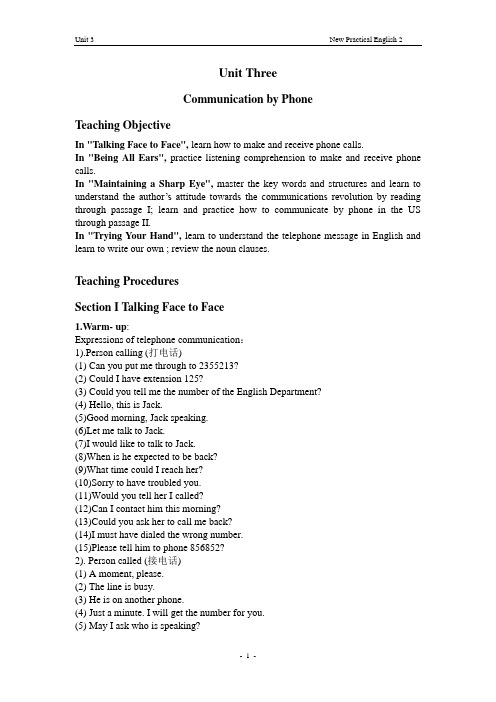
Unit ThreeCommunication by PhoneTeaching ObjectiveIn "Talking Face to Face", learn how to make and receive phone calls.In "Being All Ears",practice listening comprehension to make and receive phone calls.In "Maintaining a Sharp Eye",master the key words and structures and learn to understand the author’s attitude towards the communications revolution by reading through passage I; learn and practice how to communicate by phone in the US through passage II.In "Trying Your Hand", learn to understand the telephone message in English and learn to write our own ; review the noun clauses.Teaching ProceduresSection I Talking Face to Face1.Warm- up:Expressions of telephone communication:1).Person calling (打电话)(1) Can you put me through to 2355213?(2) Could I have extension 125?(3) Could you tell me the number of the English Department?(4) Hello, this is Jack.(5)Good morning, Jack speaking.(6)Let me talk to Jack.(7)I would like to talk to Jack.(8)When is he expected to be back?(9)What time could I reach her?(10)Sorry to have troubled you.(11)Would you tell her I called?(12)Can I contact him this morning?(13)Could you ask her to call me back?(14)I must have dialed the wrong number.(15)Please tell him to phone 856852?2). Person called (接电话)(1) A moment, please.(2) The line is busy.(3) He is on another phone.(4) Just a minute. I will get the number for you.(5) May I ask who is speaking?(6) Hold the line. I will see if he’s in.(7)Sorry, the number’s changed.(8) I’d like service for my new apartment.(9) Do you want to leave word for him to call you?(10) Could I take a message for you?2.Introduction of the samples of phone message3. Practice the two dialogues in Follow the Samples4. Practice dialogues according to the given tasks5. ExercisesSection II Being All EarsSee the textbook.Section III Maintaining a Sharp EyePassage I For Conversation Press #Text-Related Information1.A Cell Phone 手机A cell phone is a small telephone you can carry with you that operates through networks of radio antennas or space satellites. Other expressions of a cell phone:a cellular phone/telephoneb mobile phone /telephonec. a handset2.ATM 自动取款机ATM is the abbreviation for automated teller machine. ATMs are found in business districts and shopping malls. People use them to get cash from their bank accounts and in many places, to pay for gas, groceries, and other things.3.A Voice Mail 有声邮件A voice mail is a telephone answering system on which spoken messages are left by one person for another.Text ExplanationPara. 1I’ve got a cell phone, email and voice mail. But why am I so lonely?1.Important Words1)lonely adj. alone and feeling sad, lonesome 孤独的,寂寞的e.g. Without friends, she felt lonely in the city she had just arrived in.没有朋友,她在她刚到达的城市里感到了孤独。
新编实用英语综合教程2(第三版)Unit-3

4) Can you tell me your hours? Receptionist: Hello, the Art Museum. Can I help you?
Jake: Yes. Can you tell me ... er, what are the opening hours, please? Receptionist: We open at ten in the morning and close at five in the afternoon.
2) May I speak to ... ? Joe: Hello. Is this the Chemistry Department?
Secretary: Yes, it is. What can I do for you? Joe: May I speak to Mr. Mifflin?
Secretary: Hold on, please.
What You Should Know About
1. Phone service in the USA 2. Benefit or trouble of cell phones 3. Business telephone etiquette for success 4. The subjunctive mood
Bill: I’m sorry. Lady: That’s all right.
Back
Putting Language to Use
Speak and Complete
5 Imagine you are calling Judy. Complete the following conversation with her by filling in the blanks.
新编英语教程2(第三版)第3单元课件
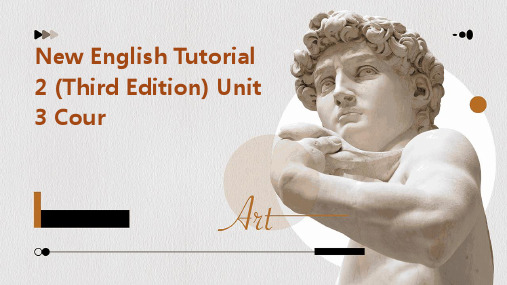
对于每道练习题,教材都提供了详细的答案解析,帮助学生理解正确答案的原因和解题思路,同时指出常见错误答案的误区。
Listening practice questions and answer analysis
05
CHAPTER
reading comprehension
本单元的阅读材料主要围绕“文化交流与全球化”展开,涉及跨文化交际、文化多样性、文化冲击等方面的内容。
Grammar exercises
04
CHAPTER
Listening training
本单元的听力材料主要包括对话、讲座、新闻报道等,旨在帮助学生提高在不同语境下的听力理解能力。
听力材料类型
听力材料的难度适中,适合大多数学生的学习水平。对于较难的部分,教材提供了详细的注释和解释。
听力材料难度
Overview of Listening Materials
03
CHAPTER
Grammar explanation
Present perfect tense
This unit focuses on the present perfect tense, which is used to talk about actions in the past that have relevance to the present.
Writing guidance
Essay writing
This type of writing requires students to present their ideas in a coherent and well-structured manner, with clear introduction, body paragraphs, and conclusion.
(完整版)新编大学英语第三版综合教程3答案

Unit 1 PersonalityVocabulary1. 1) self-conscious 2) self-confidence 3) self-esteem 4) self-destructive 5) self-worth6) self-concept 7) Self-awareness 8) self-assurance/self-confidence2. 1)B 2)I 3)L 4)A 5)H 6)D 7)E 8)N 9)J 10)M 11)C 12)F 13)G 14)K3. 1) profound 2) jealousy 3) numerous 4) overweight 5) overcome 6) eventually7) slim 8) compliments 9) diminish 10) reassurance 11) detrimental12) isolated 13) self-esteem 14) accented4. 1) reflected 2) concerned/worried 3) profound effect/influence 4) viewed/regarded5)sensitive 6) respond/react 7)eliminated 8)overcome my fear9) concentrate on 10) made no commentTranslation1) You should spend a reasonable amount of time relaxing and exercising.2) In general children are healthier and better educated than ever before.3) When the right opportunity comes along, he’ll take it.4) Every day he sets aside some time to be with his family and enjoy life.5) I remember those dark streets and walking hand in hand with my father.6) He finally failed to live up to his parents’ expectations.7) In contrast, our use of oil has increased enormously.8) He succeeded in his efforts to overcome his fatal weakness.Part Four Writing and Translation2. Translation Practice1) It is believed that pessimism often leads to hopelessness, sickness and failure.2) Optimism, by contrast, can make you happy, healthy and successful.3) When you fail in something, profit from the failure as a learning experience.4) Think about your strengths and build up self-confidence in front of problems or difficulties.5) Don’t let negative thoughts hold you back.6) Everyone has experienced failures and disappointments, so don’t blame yourself too much.Unit 2 Myths and LegendsVocabulary1. 1) A. invitation B. invited C. inviting 2) A. prepare B. prepared C. preparation D. preparatory/preparation3) A. discoveries B. discoverers C. discovered4) A. approval B. approve C. approved D. approving E. disapprove5) A. eloquent B. eloquence C. eloquently6) A. faithful B. unfaithful/faithless C. faith d. faithfully7) A. occasional B. occasionally C. occasion8) A. delivery B. delivering C. delivered9) A. troublesome B. troubled C. troubled D. troubling 10) A. assurance B. assured C. assure2. 1) got/ran into trouble 2) no trouble 3) asking for trouble 4) have … trouble 5) troublewith6) in serious/deep/big trouble 7) get/getting … into trouble 8) took the trouble3. 1) with a pattern of roses 2) prepared a wonderful/goof meal for us3) promised faithfully 4) deliver this letter5) a selection of milk and plain chocolate 6) keep out of mischief/behave themselves7) the sound of distant thunder 8) received approval from the government9) in spite of the fact that he drank too much 10) agree whether the drug is safe or notPart Three Further Development5. Complete the following Ancient Chinese story by translating the Chinese into English1) the true reason why there was no such animal in Guizhou2) they were of no use at all in this place3) when he saw the donkey all of a sudden, he thought it was a monster4) he hid himself in the trees while looking at the donkey5) what kind of animal is this and why does it look different from other animals that I’ve seen?6) But one day the donkey stretched its thin neck and cried7) the tiger discovered that the donkey didn’t have any other skills besides crying8) But he dared not rush to it and eat it just as he did to other animals9) This did irritate the donkey (made the donkey angry), who raised its hind leg and kicked the tiger10) This time he rushed to it without hesitation and bit its rhroatPart Four Writing and Translation2. Translation Practice万物之初 天地还是一体 充满混沌。
新编英语教程2(第三版)第5单元课件
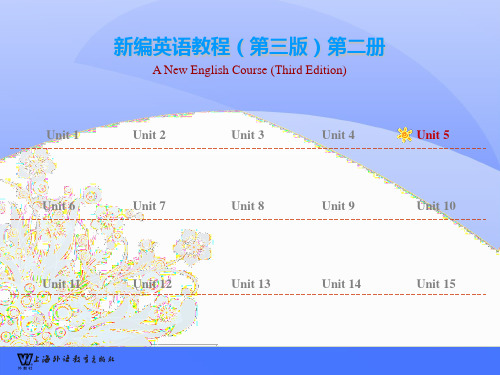
新编英语教程(第三版)第二册
Unit 5 Music Lead-In LSP Dialogue Role-Play L &S Reading Writing Exercises
Preparatory Questions
Change the active sentences into the passive sentences: 1. sentences containing the make somebody do something pattern
新编英语教程(第三版)第二册
Unit 5 Music Lead-In LSP Dialogue Role-Play L &S Reading Writing Exercises
moat: a deep wide channel that was dug around a castle, etc. and filled with water to make it more difficult for enemies to attack.
新编英语教程(第三版)第二册
Unit 5 Music Lead-In LSP Dialogue Role-Play L &S Reading Writing Exercises
tote: to carry sth, especially sth heavy e.g. We arrived, toting our bags and suitcases.
新编英语教程(第三版)第二册
Unit 5 Music Lead-In LSP Dialogue Role-Play L &S Reading Writing Exercises
yodel: to sing or call in the traditional Swiss way, changing your voice frequently between its normal level and a very high level. 用岳得尔歌调唱,唱岳得尔歌
新视野大学英语第三版读写教程第二册Unit 3 Door closer, are you?(课文+词汇)
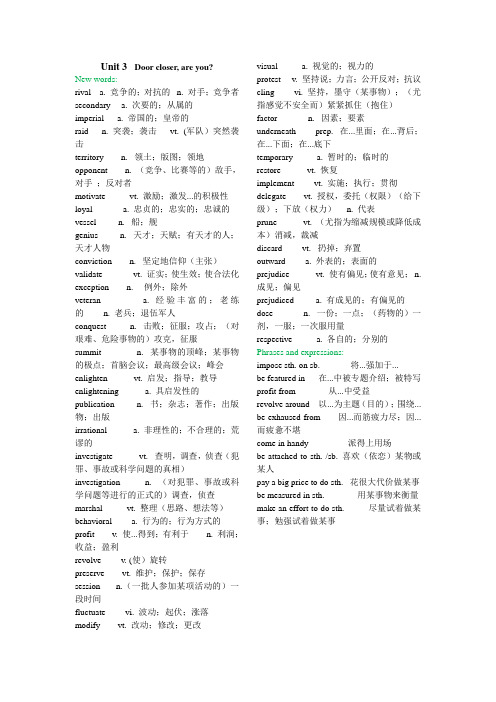
Unit 3 Door closer, are you?New words:rival a. 竞争的;对抗的 n. 对手;竞争者secondary a. 次要的;从属的imperial a. 帝国的;皇帝的raid n. 突袭;袭击 vt. (军队)突然袭击territory n. 领土;版图;领地opponent n. (竞争、比赛等的)敌手,对手;反对者motivate vt. 激励;激发...的积极性loyal a. 忠贞的;忠实的;忠诚的vessel n. 船;舰genius n. 天才;天赋;有天才的人;天才人物conviction n. 坚定地信仰(主张)validate vt. 证实;使生效;使合法化exception n. 例外;除外veteran a. 经验丰富的;老练的 n. 老兵;退伍军人conquest n. 击败;征服;攻占;(对艰难、危险事物的)攻克,征服summit n. 某事物的顶峰;某事物的极点;首脑会议;最高级会议;峰会enlighten vt. 启发;指导;教导enlightening a. 具启发性的publication n. 书;杂志;著作;出版物;出版irrational a. 非理性的;不合理的;荒谬的investigate vt. 查明,调查,侦查(犯罪、事故或科学问题的真相)investigation n. (对犯罪、事故或科学问题等进行的正式的)调查,侦查marshal vt. 整理(思路、想法等)behavioral a. 行为的;行为方式的profit v. 使...得到;有利于n. 利润;收益;盈利revolve v. (使)旋转preserve vt. 维护;保护;保存session n.(一批人参加某项活动的)一段时间fluctuate vi. 波动;起伏;涨落modify vt. 改动;修改;更改visual a. 视觉的;视力的protest v. 坚持说;力言;公开反对;抗议cling vi. 坚持,墨守(某事物);(尤指感觉不安全而)紧紧抓住(抱住)factor n. 因素;要素underneath prep. 在...里面;在...背后;在...下面;在...底下temporary a. 暂时的;临时的restore vt. 恢复implement vt. 实施;执行;贯彻delegate vt. 授权,委托(权限)(给下级);下放(权力)n. 代表prune vt. (尤指为缩减规模或降低成本)消减,裁减discard vt. 扔掉;弃置outward a. 外表的;表面的prejudice vt. 使有偏见;使有意见;n. 成见;偏见prejudiced a. 有成见的;有偏见的dose n. 一份;一点;(药物的)一剂,一服;一次服用量respective a. 各自的;分别的Phrases and expressions:impose sth. on sb. 将...强加于...be featured in 在...中被专题介绍;被特写profit from 从...中受益revolve around 以...为主题(目的);围绕... be exhaused from 因...而筋疲力尽;因...而疲惫不堪come in handy 派得上用场be attached to sth. /sb. 喜欢(依恋)某物或某人pay a big price to do sth. 花很大代价做某事be measured in sth. 用某事物来衡量make an effort to do sth. 尽量试着做某事;勉强试着做某事Door closer, are you?1 The next time you're deciding between rival options, one which is primary and the other which is secondary, ask yourself this question: What would Xiang Yu do?2 Xiang Yu was a Chinese imperial general in the third century BC who took his troops across the Zhang River on a raid into enemy territory. To his troops' astonishment, he ordered their cooking pots crushed and their sailing ships burned.3 He explained that he was imposing on them a necessity for attaining victory over their opponents. What he said was surely motivating, but it wasn't really appreciated by many of his loyal soldiers as they watched their vessels go up in flames. But the genius of General Xiang Yu's conviction would be validated both on the battlefield and in modern social science research. General Xiang Yu was a rare exception to the norm, a veteran leader who was highly respected for his many conquests and who achieved the summit of success.4 He is featured in Dan Ariely's enlightening new publication, Predictably Irrational,a fascinating investigation of seemingly irrational human behavior, such as the tendency for keeping multiple options open. Most people can't marshal the will for painful choices, not even students at the Massachusetts Institute of Technology (MIT), where Dr. Ariely teaches behavioral economics. In an experiment that investigated decision-making, hundreds of students couldn't bear to let their options vanish, even though it was clear they would profit from doing so.5 The experiment revolved around a game that eliminated the excuses we usually have for refusing to let go. In the real world, we can always say, "It's good to preserve our options." Want a good example? A teenager is exhausted from soccer, ballet, piano, and Chinese lessons, but her parents won't stop any one of them because they might come in handy some day!6 In the experiment sessions, students played a computer game that provided cash behind three doors appearing on the screen. The rule was the more money you earned, the better player you were, given a total of 100 clicks. Every time the students opened a door by clicking on it, they would use up one click but wouldn't get any money. However, each subsequent click on that door would earn a fluctuating sum of money, with one door always revealing more money than the others. The important part of the rule was each door switch, though having no cash value, would also use up one of the 100 clicks. Therefore, the winning strategy was to quickly check all the doors and keep clicking on the one with the seemingly highest rewards.7 While playing the game, students noticed a modified visual element: Any door left unclicked for a short while would shrink in size and vanish. Since they already understood the game, they should have ignored the vanishing doors. Nevertheless, they hurried to click on the lesser doors before they vanished, trying to keep them open. As a result, they wasted so many clicks rushing back to the vanishing doors that they lost money in the end. Why were the students so attached to the lesser doors? They would probably protest that they were clinging to the doors to keep future options open, but, according to Dr. Ariely, that isn't the true factor.8 Instead of the excuse to maintain future options open, underneath it all the students' desire was to avoid the immediate, though temporary, pain of watching options close."Closing a door on an option is experienced as a loss, and people are willing to pay a big price to avoid the emotion of loss," Dr. Ariely says. In the experiment, the price was easily measured in lost cash. In life, the corresponding costs are often less obvious such as wasted time or missed opportunities.9 "Sometimes these doors are closing too slowly for us to see them vanishing," Dr. Ariely writes. "We may work more hours at our jobs without realizing that the childhood of our sons and daughters is slipping away."10 So, what can be done to restore balance in our lives? One answer, Dr. Ariely says, is to implement more prohibitions on overbooking. We can work to reduce options on our own, delegating tasks to others and even giving away ideas for others to pursue. He points to marriage as an example, "In marriage, we create a situation where we promise ourselves not to keep options open. We close doors and announce to others we've closed doors."11 Since conducting the door experiment, Dr. Ariely says he has made a conscious effort to lessen his load. He urges the rest of us to resign from committees, prune holiday card lists, rethink hobbies and remember the lessons of door closers like Xiang Yu.12 In other words, Dr. Ariely is encouraging us to discard those things that seem to have outward merit in favor of those things that actually enrich our lives. We are naturally prejudiced to believe that more is better, but Dr. Ariely's research provides a dose of reality that strongly suggests otherwise.13 What price do we pay for trying to have more and more in life? What pleasure and satisfaction can be derived from focusing our energy and attention in a more concentrated fashion? Surely, we will have our respective answers.14 Consider these important questions: Will we have more by always increasing options or will we have more with fewer, carefully chosen options? What doors should we close in order to allow the right windows of opportunity and happiness to open?。
新编英语教程2(第三版)第2单元课件
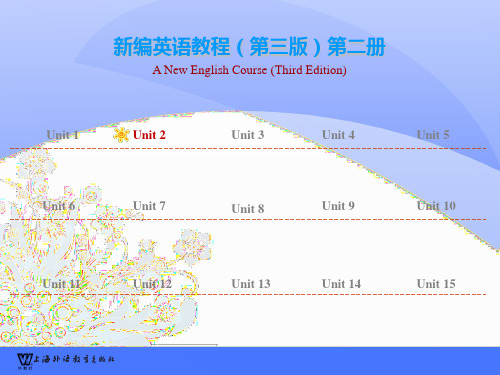
新编英语教程(第三版)第二册
Unit 2 A Trip to Huangshan Lead-In LSP Dialogue Role-Play L &S Reading Writing Exercises
hidden: being out of sight or not readily apparent. hide or hair — 踪迹;痕迹 e.g.: I haven’t seen hide nor hair of them since the argument. 自从那次争论后,我连他们的影子也没看到。
新编英语教程(第三版)第二册
Unit 2 A Trip to Huangshan Lead-In LSP Dialogue Role-Play L &S Reading Writing Exercises
2) What do you call a person who advises people about the law and represents them in court?
e.g.: It was another day of mind-numbing tedium.
新编英语教程(第三版)第二册
Unit 2 A Trip to Huangshan Lead-In LSP Dialogue Role-Play L &S Reading Writing Exercises
新编英语教程(第三版)第二册
Unit 2 A Trip to Huangshan Lead-In LSP Dialogue Role-Play L &S Reading Writing Exercises
mind-numbing: If you describe an event or experience as mind-numbing, you mean that it is so bad, boring, or great in extent that you are unable to think about it clearly.
新编英语教程第三版李观仪Unit课文及译文参考
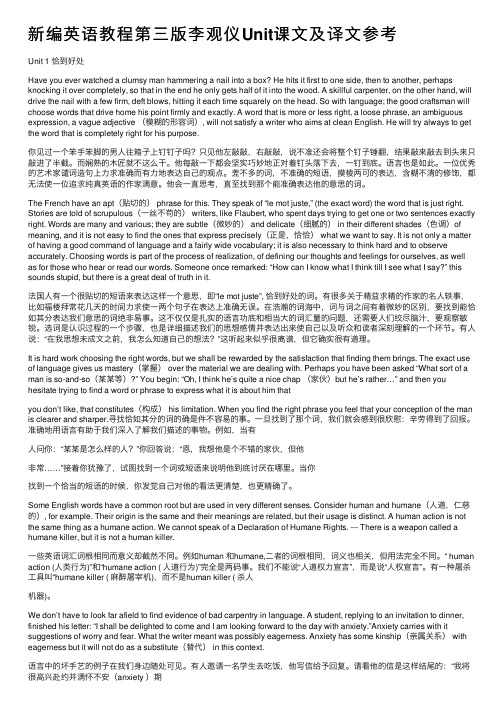
新编英语教程第三版李观仪Unit课⽂及译⽂参考Unit 1 恰到好处Have you ever watched a clumsy man hammering a nail into a box? He hits it first to one side, then to another, perhaps knocking it over completely, so that in the end he only gets half of it into the wood. A skillful carpenter, on the other hand, will drive the nail with a few firm, deft blows, hitting it each time squarely on the head. So with language; the good craftsman will choose words that drive home his point firmly and exactly. A word that is more or less right, a loose phrase, an ambiguous expression, a vague adjective (模糊的形容词), will not satisfy a writer who aims at clean English. He will try always to get the word that is completely right for his purpose.你见过⼀个笨⼿笨脚的男⼈往箱⼦上钉钉⼦吗?只见他左敲敲,右敲敲,说不准还会将整个钉⼦锤翻,结果敲来敲去到头来只敲进了半截。
⽽娴熟的⽊匠就不这么⼲。
他每敲⼀下都会坚实巧妙地正对着钉头落下去,⼀钉到底。
语⾔也是如此。
新编英语教程2unit3PPT课件
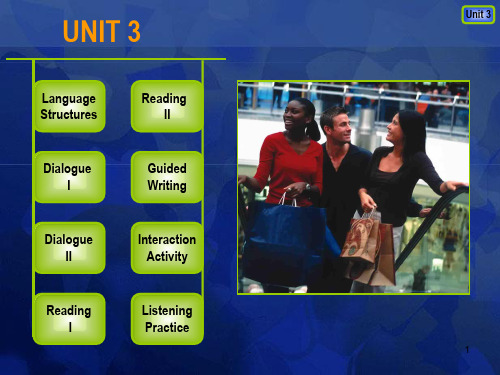
let me know.
.
16
Language Points
.
15
Language Points
Dialogue I Unit 3
1 You’re not bothered by rude people with their rough behaviour
①Bother
1.WORRY
e.g. Being in a crowd really bothers me. It was very noisy, but that
didn't bother me.
It really bothered me that he'd forgotten my birthday.
2. DISTURB OR ANGER
e.g. Sorry to bother you, but Mr. Grey is on the line.
Cliff didn't want to bother himself with masses of detail.
condition again e.g. The hotel has been renovated and redecorated.
[NOUN] renovation
.Leabharlann 11Unit 3Dialogue Farewell to Rude Manners I
Think it
➢ When someone treats you rudely, what is your response?
.
14
Unit 3
Dialogue Farewell to Rude Manners I
Retell
新编英语教程unit3
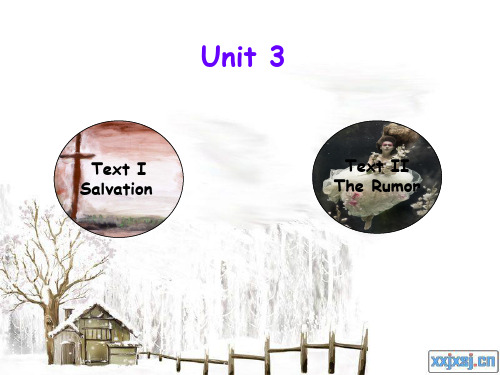
2. …to bring the young lambs to the fold. --to persuade the children to become members of the church. In other words, to save their souls and free them from sin.
Salvation religions are typically founded by a prophet or religious leader who creates a basic doctrine which explains to people how salvation might be achieved. The legitimacy and long-term authority of these prophets is often dependent upon possessing a high degree of personal charisma and, sometimes, the ability to work miracles presumably a sign of divine favor and sanction.
6. The preacher preached a wonderful rhythmical sermon, all moans and shouts and lonely cries and dire pictures of hell… rhythmical--[‘riðmikəl, ’riθ-] marked by regular succession of weak and strong stresses, accents, sounds or movements (in speech, music,etc.) His breathing became more rhythmical. 他的呼吸变得更有节奏了。 sermon– a talk usually bsed on a sentence or verse from the Bible and preached as part of a church service. 布道; 冗长的讲话。 He was preaching a sermon about giving up smoking to his son. 他正在对他的儿子讲有关戒烟的大道理。
新编实用英语综合教程2(第三版)Unit3

5) Where did Dr. An drive Tom to, the hotel or the school? The hotel.
Back
Unit | Three
Listen and Complete
6 Listen to the dialogue for the last time and fill in the blanks according to what you have heard.
ten-minute, fifteen-minute walk to the school.
Back
Unit | Three
Listen and Answer 5 Listen to the dialogue again and then answer the following questions orally.
Unit | Three
Communication by Phone
Unit | Three
Handling a Dialogue
Listen and Decode
Script
4 Listen to a dialogue and decode the message by finding out the correct choices in the brackets according to what you have heard.
need to mention the mobile phones people play with evห้องสมุดไป่ตู้rywhere. The fixed phones
are easily accessible. Almost every 2 __fa_m__il_y_ has a phone. Some families even
- 1、下载文档前请自行甄别文档内容的完整性,平台不提供额外的编辑、内容补充、找答案等附加服务。
- 2、"仅部分预览"的文档,不可在线预览部分如存在完整性等问题,可反馈申请退款(可完整预览的文档不适用该条件!)。
- 3、如文档侵犯您的权益,请联系客服反馈,我们会尽快为您处理(人工客服工作时间:9:00-18:30)。
Unit 3I Lead-inII Language StructuresModal auxiliaries1. would + perfect infinitive used to express “unfulfilled wish”e.g. I would have liked to sign up, but I sprained my ankle.2. should /ought to + perfect infinitive used to express “unfulfilled obligation”needn’t + perfect infinitive expressing “unnecessary past actions”e.g. 1) She should/ ought to have had more oral practice during the term.2) She needn’t have learned all the dialogues by heart.3. may /might + perfect infinitive used to express “speculations about past actions”can /could not + perfect infinitive used toexpress “negative deduction about past actions”e.g. 1)He may/might have gone to the library.2) She can’t/couldn’t have gone to the library.4. must + perfect infinitive used to express “affirmative deduction about past actions”may /might as well used with the second person pronoun expressing “suggestions”e.g. 1) She must have gone to the language lab.2) Y ou may/might as well use my bike.Preparatory QuestionsDirections: Recast the following sentences using the following phrases:1. “would have liked to (do)”Notice:would have liked to (do)is used with the first person to express the speaker’s wish that was not fulfilled.1) I intended to go skating with you yesterdaybut I couldn’t because my mother didn’t let me.(Response: I would have liked to go skating with you yesterday, but my mother didn’let me.)2) I meant to sit in on Professor Wang’s class this morning but I didn’t because I had an important meeting to attend.(Response: I would have liked to sit in on Professor Wang’s class this morning, but I had an important meeting to attend.)3) I intended to take part in the basketball match yesterday afternoon but I couldn’t because I had a bad fall yesterday morning. (Response: I would have liked to take part in the basketball match yesterday afternoon, but I had a bad fall yesterday morning.)4) I planned to lend you my cassette recorder, but I didn’t, because it was out of order. (Response: I would have liked to lend you my cassette recorder, but it was out oforder.)2. should/ought to + perfect infinitive Notice:should/ought to + perfect infinitive, indicating a past obligation that was not fulfilled1) The exhibition was a good one. All of us visited it except John.(Response: : John should/ought to have come with us.)2) We all learned a lot from the lecture, but Li didn’t attend it.(Response: : Li ought to/should have attended the lecture.)3) The engineer went to the research institute without an umbrella and was caught in the rain.(Response: : The engineer ought to/should have taken an umbrella with him.)4) They bought a book for Mary but she didn’t like it.(Response: : They oughtn’t to/shouldn’t havebought the book for Mary.)needn’t + perfect infinitiveNotice: needn’t + perfect infinitive, indicating something that was unnecessarily done in the past1) I wrote a summary in more than five hundred words. But the teacher only asked for 200 words.(Response: : I needn’t have written such a long summary.)2) Lin answered all the ten questions in the test paper. But we were only required toanswer eight of them.(Response: : Lin needn’t have answered all the ten questions in the test paper.)3) Mary went to the station an hour before the train started.(Response: : Mary needn’t have gone to the station so early.)4) Yao carried all the parcels home herself. She didn’t know they would deliver them ifshe asked them.)(Response: : Yao needn’t have carried all the parcels home herself. They would have delivered them if she had asked them.)3.may/might +perfect infinitiveNotice: may/might +perfect infinitive, indicating speculations about past actions1) Where is Susan? I want to go to the canteen with her.(Response: : She may/might have gone there already.)2) It’s a fortnight since Sun went to the South and we haven’t got a word from him. I wonder if he’s forgotten us all. (Response: : He may/might have been very busy with his work there.)3) Sid told me he’d let me have the library book after he’d finished with it. It’s a week since he said that and he still hasn’t given me the book.(Response: : He may/might have returned thebook to the library. // He may / might not have finished reading it yet.)4) I’ve been looking for my bicycle key for three days, and it’s still nowhere to be found. (Response: : You may/might have lost it.)can’t/couldn’t + perfect infinitiveNotice: can’t/couldn’t + perfect infinitive, indicating negative deduction about past actionsThe first part of the response can be given to the students as a prompt.1) Where is my typewriter? Someone must have stolen it last night.(Response: : It was here a moment ago. It couldn’t have been stolen last night.)2) Keith ought to be here now. Perhaps he’s lost his way.(Response: : I told him how to come and I even drew him a map. He can’t have lost his way.)3) Who brought the refrigerator upstairs?Perhaps it was Tim.(Response: : Tim’s not that strong. He couldn’t have brought it by himself.)4) A man answered the phone. I suppose it was her husband.(Response: : But her husband hasn’t come back from abroad yet. It couldn’t have been her husband.)4. must + perfect infinitiveNotice: must + perfect infinitive, indicating affirmative deduction about past actions1) The film he saw last night was wonderful. (Response: : He must have enjoyed seeing it.)2) He looks tired, doesn’t he?(Response: : He must have worked hard. / He must have stayed up late last night.)3) The children were making a lot of noise until five minutes ago. Now it is so quiet. (Response: : The children must have gone away.)4) James has checked all the figures twice over,but he can’t get the correct answer. (Response: : James must have made a mistake somewhere.)5. may/might as wellNotice: may/might as well, used with the second person pronoun to express the speaker’ssuggestion(s)1) I am so exhausted after work. (Response: : You may/might as well go to sleep.)2) I’m not feeling well. I think I’ve got a cold. (Response: : Being so weak, you may/might as well see a doctor.)3) It is too hot for Karen and me to go for a picnic.(Response: : Why don’t you change it to another day? You may/might as well go to a movie today.)4) Nick won’t take up the additional work. He just wants to do his part.(Response: : You may/might as well ask Lucy to do it. To get ahead on her job, she iswilling to try new things.)Dialogue Pollution ControlA.Listening to the recordingB.Q uestions on the dialogue1.W hy is London no longer a city full of fog?2.W hat is the cause of air and water pollution in the city where A lives?3.W hat problems do car bring?4.W hat should be done to bring pollution in China completely under control?5.D o you think that environmental pollution in China has been effectively reduced? If so, please cite some facts or examples.C. Language Points1.It must be terrible living there.—Living there must be terrible. The introductory it is a formal subject, whereas the -ing participleliving is the real subject. Another example, e.g. It is great fun boating on the lake.2. the Clean Air Ac t — This was the result of the recommendations made by the Beaver Committee which was set up to inquire into the question of urban pollution in Britain. The committee was so named because its chairman was Sir Hugh Beaver.3. enforce v .give emphasis or strength to sth.加强;make sth.(a law ) obeyed or effective by force强迫服从,实施;force or cause sth. to be done or to happen迫使(某事)发生e.g. 1) Mike must provide enough examples to enforce his argument.2) Y ou have no right to enforce your own views on me.3) The government is unable to enforce its own laws and regulations.4. the Thames/temz/is swarmingwith fish —the River Thames is full of fish that move about busily. The names of rivers are preceded by the definite article the, e.g., the Yangzi River, the Yellow River, the Hudson River, the River Mississippi.e.g. 1)Each summer the swimming pool swarms with people.2) That town is always swarming with tourists from all over the world.5. double: twice as much or as many as usual; 成双的,双重的,两倍的a. n. v.a double bed/room at/on the double 迅速地,立即地;以跑步方式e.g.1) The boss will give him double pay for working overtime.2) The date had a double significance.3) Y ou’d better be double careful when crossing the street.4) The population of Japan doubles that of Canada.5) The child birthrate in that area hasdoubled.6. torment n. extreme suffering, especially mental suffering; a person or thing that causes this.痛苦,折磨 v.e.g. 1) Love is a sweet torment.2) David has never suffered the torment of rejection.3)They never torment themselves or each other over imperfections.7.treatment devices—devices used to treat smoke, dust, and water pollution 治理三废设备e.g. 1) The television receiver is an electronic device.2) Sending advertising by email is very effective marketing device.3) His illness is merely a device to avoid seeing his girlfriend.8. residential a. containing or suitable for private houses; connected with or based on residence住宅的,与居住有关的e.g.1) Gradually the surrounding farmland turned into residential areas.2) It is a nice residential section, equipped with modern conveniences.resident a. 居住的;n.居民,居住者residence n. 居住,住宅reside v.居住,定居9.irritate v. make ab. angry, annoyed or impatient 激怒,使烦躁;cause discomfort to(a part of body)使不舒服,刺激e.g. 1) Our faults irritate us most when we see them in others.2) Her effusive manner of greeting her friends finally began to irritate them.3) These tight shoes irritate my toes.10. more and more people have come to know how harmful... —more and morepeople begin to know how harmful ... The infinitive after the verb come expresses an action that takes place gradually over some time.e.g.After working with Mrs. Brown, who appeared quite hard-hearted, in the same office for many years, I’ve come to see that she has a heart of gold.11. make stricter laws to that effect—make stricter laws with the intention to forbid car horns blowing in the streets. The word effect refers to what B says in the preceding line “it’s against the law to blow car horns in any street in town.”to that effect: used to show that you’re giving the general meaning of what sb. has said or written rather than te exact words表示那个/这个意思,大意如此e.g.1)He said he was greatly worried, or words to that effect.2) Mary said she hated to see John, or hearof the words to that effect.to this/the effect 大意是说to good/great/ dramatic effect 产生好的结果to no effect 无效果,不起作用Expressions in Focus1. “do away with...”—terminate, get rid of; abolish sth. e.g.e.g. 1) Why not do away with all the junk in your room? It is getting more and more untidy!2) How could they do away with a lovely old building like that and put a car park there instead?3) These ridiculous rules and regulations should have been done away with years ago.2. “add to…”— increase or have an increased effect;“add sth. to sth.” —put sth. together with sth. else so as to increase e.g.e.g.1) His words did nothing but added to myanger.2) The bad weather only added to our difficulties.3) Teachers should exercise their imagination and add art to their teaching.3. “bring…under control”—subdue or master sth.e.g.1) To bring the noisy children under control, the teachers told them the story of “Buzzy Bees”.2) Hundreds of firemen have brought a wildfire spread over nine square kilometers of land under control after battling to put out the flames for two days.3) The Prime Minister said yesterday that the government is making all efforts to bring the high inflation under control.D. RetellingSample outline for retellingB, a student from England, is talking to A about the pollution problem.1. B tells A about London at present: the steps that have been taken by the government and the change that has taken place.2. A and B talk about the pollution problem in China:1) air pollution in factory zones;2) noise pollution in city streets;3) A tells B that the Chinese government has taken some measures to control pollution.Reading I Environment PollutionA. Pre-Reading ActivityThe environmental pollution on our planet has caused undesirable change and harmfully affected health, survival and activities of humans and other living organisms. Now, please think about the following questions before you read the text.1.What are the major causes of environmental pollution?Sample: Development of industry and Urbanization.2.Is the place where you live polluted or even seriously polluted? If so, describe to your partner.3. What can we do to reduce environmental pollution?Sample: We should curb the sewage and smoke from factories, perform garbage classification and recycle wastes.B. Background NotesParticle Pollution (PM10) and (PM2.5)1.Particle(n.颗粒,微粒;微量,极小量) pollution(also known as "particulate<n.微粒,颗粒,粒子> matter") in the air includes a mixture of solids and liquid droplets(液体的小滴). Some particles are emitted directly; others are formed in the atmosphere when other pollutants react. Particles come in a widerange of sizes. Those less than 10 micrometers in diameter直径(PM10) are so small that they can get into the lungs, potentially causing serious health problems. Ten micrometers is smaller than the width of a single human hair. Fine particles (PM2.5). Particles less than 2.5 micrometers in diameter are called "fine" particles. These particles are so small they can be detected only with an electron microscope. Sources of fine particles include all types of combustion, including motor vehicles, power plants, residential wood burning, forest fires, agricultural burning, and some industrial processes.Coarse(粗糙的,粗鲁的;粗野的,粗俗的)dust particles. Particles between 2.5 and 10 micrometers in diameter are referred to as "coarse." Sources of coarse particles include crushing or grinding operations, and dust stirred up by vehicles traveling on roads.2. fog and haze雾霾Fog and haze differ in that fog is a thick, opaque(不透明的,晦涩的;难以理解的)effect that lasts a short time, while haze is a thin, translucent (a.半透明的)effect that lasts a long time.FogWhether created by nature or machine, fog consists of liquid droplets suspended(v.使悬浮;悬,挂;停止,终止;延缓,暂缓执行)in the air. Fog machines create fog by vaporizing(v.使蒸化,使汽发;吹牛,吹嘘)fog fluid –that is, they convert the fog fluid from a liquid form to an aerosol(n.悬浮微粒,浮质;烟雾机,气雾剂)form.HazeLike fog, haze consists of liquid droplets, but the drops are very fine and are distributed evenly over a large area to form a mist.C.Questions on P35.nguage Points1.surroundings—the conditions, scenery,etc. around a person, place or thing; environment. The word “surrounding”, however, is generally used as an adjective.e.g. They make regular checks on the surrounding areas for pollution levels.2. The adjective “dirty” and the noun “poison” are used as verbs here, which respectively mean “to make…dirty” and “to put poison in” or “to cause poisoning”.3.pesticide n. chemical substance used to kill pests, esp. insectse.g.1)The biotechnology company is developing a range of new pesticide.2)The insects have become resistant to the pesticide.4.ruin v. n. severe damage or destruction毁灭,破坏;废墟e.g.1) The most glorious city at the time was burned down to be fiery ruins.2) Whom God would ruin, he first deprives of reason.3)One indiscreet remark at the wrong moment could ruin the whole plan.若时机不当,一言不慎,可能毁掉整个计划。
